| |
"A happy marriage would not really be a story. Two people get married and they live happily ever after – there's nothing to make. But if you tell the truth about people getting married, unfortunately they do not live happily ever after. If they're fortunate they live together ever after." |
| |
Director Stanley Donen |
I'm not generally a fan of films that could comfortably wear the label of 'romantic comedy'. Then again, I'm not much of a romantic, though I'm also well aware that the often sugary and idealised view of relationships and their problems that these films present bears precious little resemblance to their real world equivalent. And they do tend to play to a tiresomely rigid formula, with the sole purpose of the tale being to ensure that handsome male A and pretty female B overcome all artificially manufactured barriers so that that can get together and live happily ever after. Occasionally the protagonists will already be in a relationship that has gone a bit sour, but time and a few battles against emotional adversity will soon sort that out. Hell, these kids were made for each other!
It struck me immediately that this is not the sort of film that Eureka's Masters of Cinema label tends to put out on Blu-ray, so when they announced that they were releasing Two for the Road and called it a "popular 1960s romantic comedy-cum-road movie" in their press notes, I raised a curious eyebrow. There were, however, three of points of immediate interest. The first is the lead players – back in 1967, you wouldn't get actors of the calibre of Albert Finney and Audrey Hepburn together for insubstantial fluff. The second was that the film was written by Frederic Raphael, whose last theatrical feature script was Eyes Wide Shut for Stanley Kubrick, which is some way from your standard relationship drama. The third was that the film was directed by Stanley Donen, the man who co-directed the cinematically thrilling Singin' in the Rain, who later blended comedy, mystery and romance to delightful effect in Charade, and who immediately after directing Two for the Road made the hilarious Bedazzled with Peter Cook and Dudley Moore. It's also one of horror makeup maestro Tom Savini's favourite films. OK, now you have my attention.
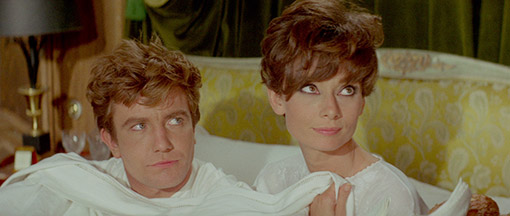
Then the film starts and our lead players Joanna and Mark Wallace (Hepburn and Finney) drive into the middle of a countryside wedding and pass comment on the apprehensive-looking newlyweds. "They don't look very happy," Joanna observes. "Why should they?" Mark responds. "They just got married." Amusing though this is, it does tend to drop the film into that second category, the one in which a couple whose relationship has hit a rocky patch and who will eventually come to realise that they love each other after all. It's a suspicion emphasised by that dig at the institution of marriage, as any man who takes a poke at marriage in a Hollywood film of this vintage (and Mark misses no opportunity to do so) almost always ends up having to eat his words or become shunned by their peers. Bloody hell, this is one seriously conservative genre.
But whatever the outcome might be, it soon becomes evident that the journey there is going to be far from conventional. Over the course of the film, director Donen and screenwriter Raphael explore the couple's relationship from its initial inception to its current, altogether shakier condition, but do so in a sometimes dizzying, non-linear fashion. Focusing exclusively on periods when Joanna and Mark were holidaying in France, the film flits back and forth between the years with no textual assistance to help identify at which stage of the relationship we're at any one time (though eagle-eyed viewers will have help from the tax discs on the windscreens of the various cars). And given that we're talking only 12 years here, neither Mark not Joanna undergo any major facial changes (no beards or wild sideburns for Mark or outrageous perms for Joanna), so you'll need to start keeping clear mental notes of costumes and cars from an early stage or you'll soon find yourself wondering where the hell you are. Donen adds to this structural complexity by having the time periods dovetail into each other, with actions match-cut and Mark and Joanna repeatedly passed by cars driven by their younger or older selves.
This playful approach to structure is reflective of the couple's initial cheerful irreverence to just about everything, something wonderfully captured by Raphael's consistently and immensely witty dialogue and the sprightly performances of the excellent leads. Hepburn in particular makes Joanna seem so much fun to be with (and come on, it's Audrey...) that you really do wonder what is going through Mark's mind when he later spends his time coldly trying to deflate what's left of her enthusiasm.
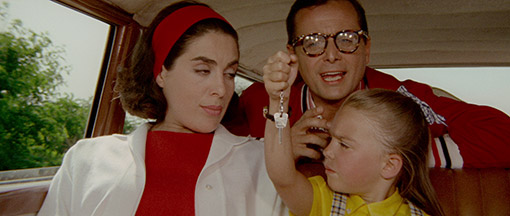
Mark's aversion to the idea of having children may be a traditional gripe, but is given some backing when the pair go touring with American friends Howard and Cathy Manchester, whose insufferable young daughter Ruth is enough to drive even the most tolerant of adults to paedocide. "Do you still want a child?" Mark asks Joanna after Ruth has thrown away the car keys and is sitting complaining while the others search the undergrowth. "I still want a child," Joanna wearily replies. "I just don't want that child." What gradually emerges is a portrait of a couple who are in love but can't seem to find a way to live with each other, although this seems to be largely because Mark develops into such a self-absorbed dick. Wrapped up in his work and seemingly resentful of any distraction, his perpetual grumpiness and lack of empathy eventually drives Joanna – albeit temporarily – into the arms of another, by when Mark already had his own, casually embarked-on affair.
The non-linear structure may sound like a gimmick designed to make the film stand out from the romantic comedy crowd, but it proves every bit as essential to the film's storytelling as it was to The Killing or Reservoir Dogs. Told in straightforward chronological fashion, this gradual decent into unhappiness would make for only moderately interesting and increasingly downbeat viewing (director Donen goes further and suggests the film would be "banal"). But by energetically and inventively darting between timelines, Donen is able to continually vary the mood and repeatedly surprise us, to the point when you really don't know what will happen next in a narrative that convention dictates should follow a predictable path. By juxtaposing scenes of the couple in different stages of their time together, Raphael and Donen are also able to comment on the changing nature of relationships by counterpointing scenes of verbal conflict with similarly themed moments of happiness from earlier years. This also allows them to provide the odd stark reminder of the couple's decline in just a few seconds of screen time. "If I ever have a car, I swear I'll never pass a single hitchhiker as long as I live," Mark proclaims as he and Joanna pause on a bridge to thumb a lift, only to have a car approach driven by his gruff older self and completely ignore a pair of travellers who are now hitching at exactly the same spot. And there's a curious logic to this approach, one that acknowledges that there are ups and downs in even the most seemingly sublime of romances, and that in more troubled times we tend to look back on happier days in an attempt to comprehend how things turned sour. It invites us to form our own picture of the decline from the snapshots provided, and repeatedly undermines expectations when the relationship looks set to break up for good, only to be rescued by an unexpected moment of honesty or vulnerability.
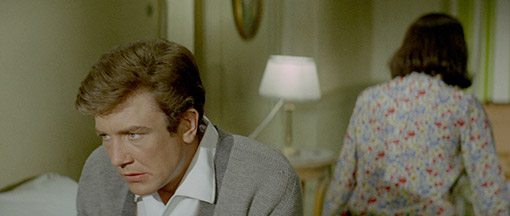
In spite of the potential barrier thrown up by such a structure, we really do get to care about our quarrelsome young couple, and start to hope against hope that they'll stop getting at each other and realise just how much they have in common. Maybe it's because I'm watching from an unavoidably male viewpoint, but there were times when I wanted to really kick Mark up the arse and try to make him realise just what he is allowing to slip through his fingers. Just occasionally he does. Some of his later declarations of love may ring a little hollow, but when they do register it's a bit like being hit in the heart by a big softie beanbag. It helps no end that Mike and Joanna are played by two such talented actors at pretty much the top of their game. And while I know this will for some confirm a sort of fan-boy prejudice on my part, I have to give a particularly enthusiastic shout for the lovely Audrey, who as Joanna is utterly bewitching in her moments of joy, and painfully real in her later misery, frustration and barely restrained anger.
If you come at Two for the Road with little foreknowledge of what you're in for – as I did on my first viewing – then there's a good chance you'll spend the first twenty minutes or so trying to find your feet, and you'll need to keep your wits about even after that if you're going to build a complete picture from the jigsaw pieces provided. But it's so worth the effort. Rarely have I seen a non-linear narrative planned and executed with such precision and sense of purpose – even the time transitions are immaculately designed and handled. It peaks with the sense that each of the timelines have converged into one and that all are taking place in the here and now – one of them even undergoes a momentary on-screen mitosis, neatly illustrating that the future direction of any relationship is rarely set in stone.
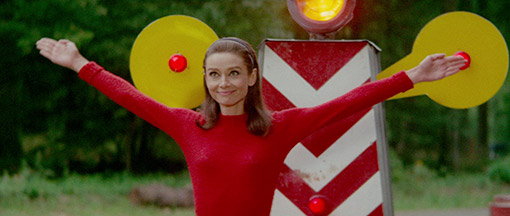
So with all the time hopping and honesty about how we sometimes behave even towards the ones we love, do Raphael and Donen deliver the happy ending that the genre usually demands? Well, that's not for me to reveal here. What I will tell you is that this consistently inventive, beautifully constructed and captivating trip through an imperfect and utterly believable romance is beautifully summarised by the final, two-word exchange between Joanna and Mark that concludes the film, and that the moment in question put the broadest of smiles on my cynical old face.
When Masters of Cinema send out their press notes for upcoming Blu-ray or dual format releases, they frequently describe the new transfers as "gorgeous". On the basis of the one here, it's not hard to see why. Framed in the film's original 2.35:1 aspect ratio, the image is occasionally just a tad aggressive on the contrast to nail those black levels, but for the most part gets the balance just right, and is complimented by a warm colour scheme that both captures the feel of a European countryside summer and reflects the time in which the film was made – even favourite film stocks like Eastmancolor have evolved over the years. The brighter colours are very nicely rendered and there's not a dust spot of trace of damage to be seen. The level of detail is consistently impressive (daylight exteriors particularly shine and the cars all look great), and the fine film grain feels about right. The image also sits rock solid in frame without a hint of movement. Excellent.
The Linear PCM 2.0 mono soundtrack may lack the bass response of later Dolby tracks, but is otherwise clear and free of any traces of damage and distortion, and Mancini's music always sounds good.
Commentary
I'm not sure when this was recorded or by whom, but its inclusion here is something to celebrate. An unidentified American voice kicks things off with a vocal biography of director Stanley Donen, then the track is handed over to the man himself for an utterly enthralling look back at the making of the film. Yes, there are a few sometimes lengthy dead spots, but the information we do get when Donen talks proves ample compensation. And there's a lot covered here, including the autobiographical elements of Frederic Raphael's script, the difficulties they faced in getting the film funded, the sound effect he wishes that he could replace (you'll have little trouble guessing which one if you watch the film), the reason they had to post-sync much of the dialogue, the casting of a young and very beautiful Jacqueline Bissett, the problems of shooting most of the film on location, how specific shots were executed, the actress who lied about her ability to water ski to land the part, and so much more. He also discusses the non-linear structure and the film's honest view of romance and marriage: "This is not a movie that says and they lived happily ever after," he states at one point, "but this is how they lived ever after." A superb inclusion.
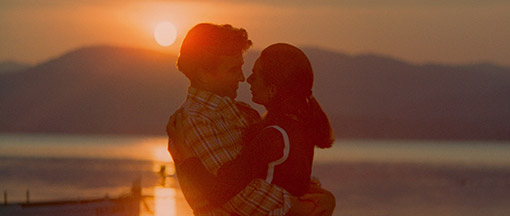
Frederic Raphael (25:34)
For the most part cropped to 2.35:1 and heavily windowboxed inside a 4:3 frame, the picture here does leave a lot of space in which to put the subtitles, as screenwriter Frederic Raphael is interviewed in fluent French (American born and British educated, Raphael was a keen traveller who eventually made his home in France) about the making of Two for the Road. And while the size of the image may require you to shuffle a bit nearer to the screen, Raphael himself is an entertaining enough raconteur to outshine this particular visual tic. He recalls how he first came up with the idea for the script, the meeting that allowed him to present it to Donen, and how the structure of the film was planned (I was surprised by this one). He also talks about his fondness for the comedy of recognition, how actors can add something extraordinary to written dialogue, the role of cars as statements and status symbols, and the real life inspiration for the Manchester family. Great stuff.
Theatrical Trailer (2:15)
"Audrey Hepburn and Albert Finney make something wonderful out of being alive" the voice-over assures us as carefully selected clips are assembled in a way that suggests this will be a conventional and thoroughly upbeat love story. Surprise!
Booklet
First up, if you don't want to know the ending of the movie before you sit down watch it, then DO NOT open this booklet until the final credits have rolled, as it's spelled out in the first paragraph of the essay by Jessica Felrice that is the booklet's main feature – it even uses that final exchange that I allude to above as the essay title. Rarely have I been happier that I don't read the booklets until after I've written my own review, and it's an essay worth reading, a perceptive analysis of the film and its themes. Also included are credits for the film, a selection of not quite pin-sharp stills, and the usual notes on how to set up your TV for those of you who still can't get that right.
Based on its subject matter, Two for the Road is the sort of film I might easily have never got around to seeing were it not for its Masters of Cinema release, and stands as proof that at their best, romantic comedies can be as smart and as structurally adventurous as the classiest dramas. Everything clicks here, from Christopher Challis's handsome scope cinematography to Henry Mancini's emotive score, and Finney and (especially) Hepburn are just sublime. Masters of Cinema has delivered another superb transfer and backed it with a small but perfectly targeted selection of very fine extras. Highly recommended.
|